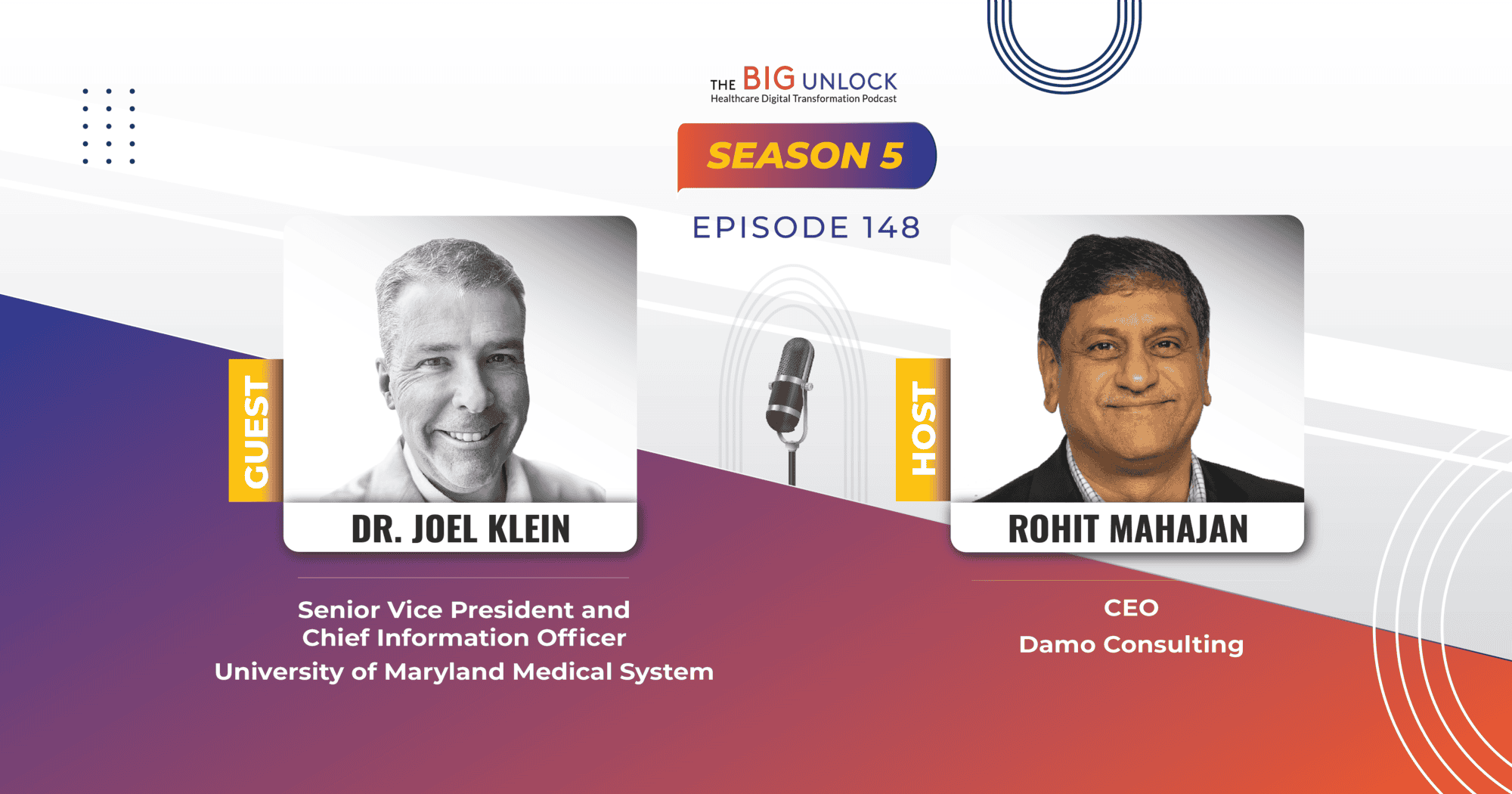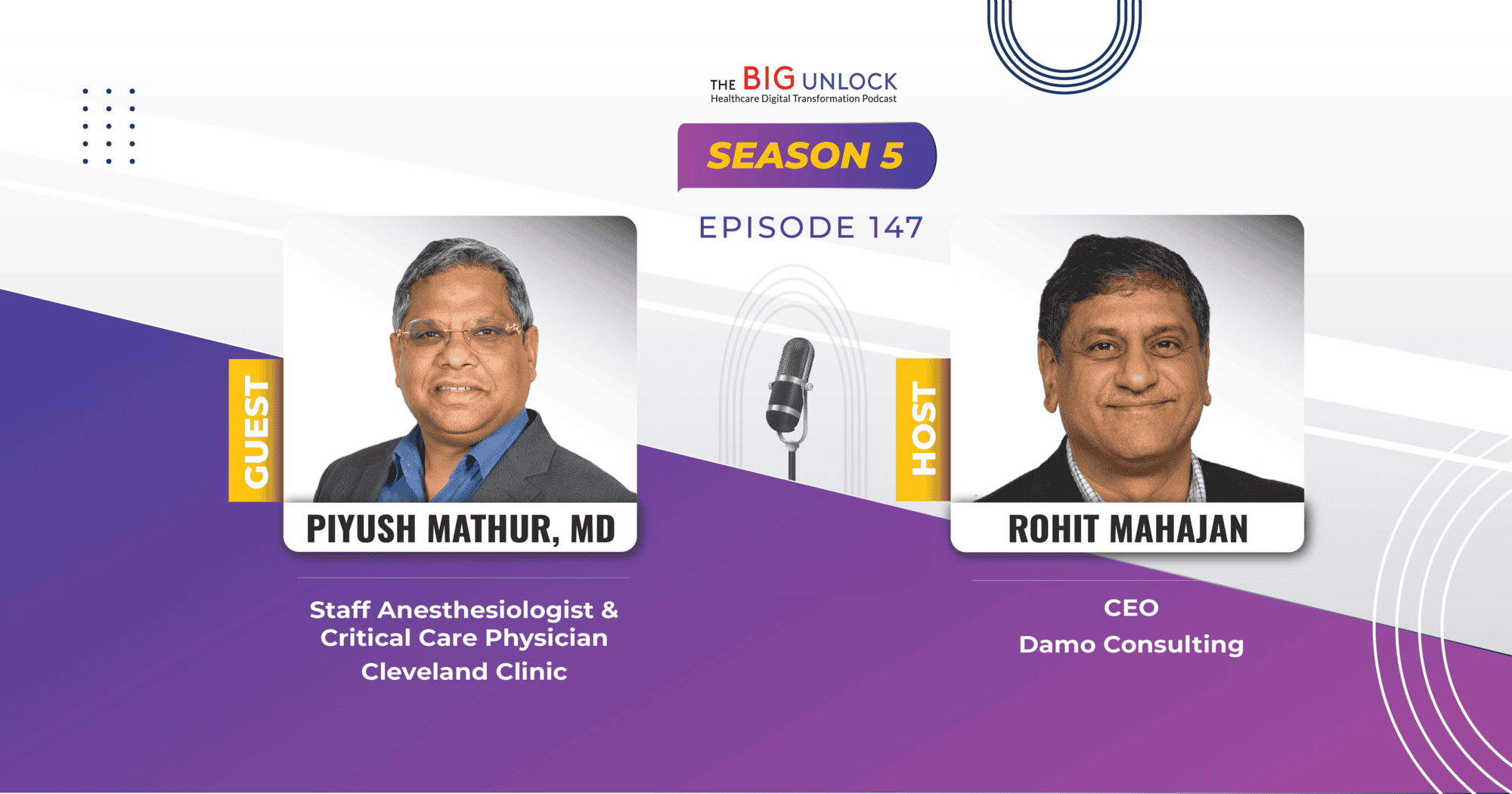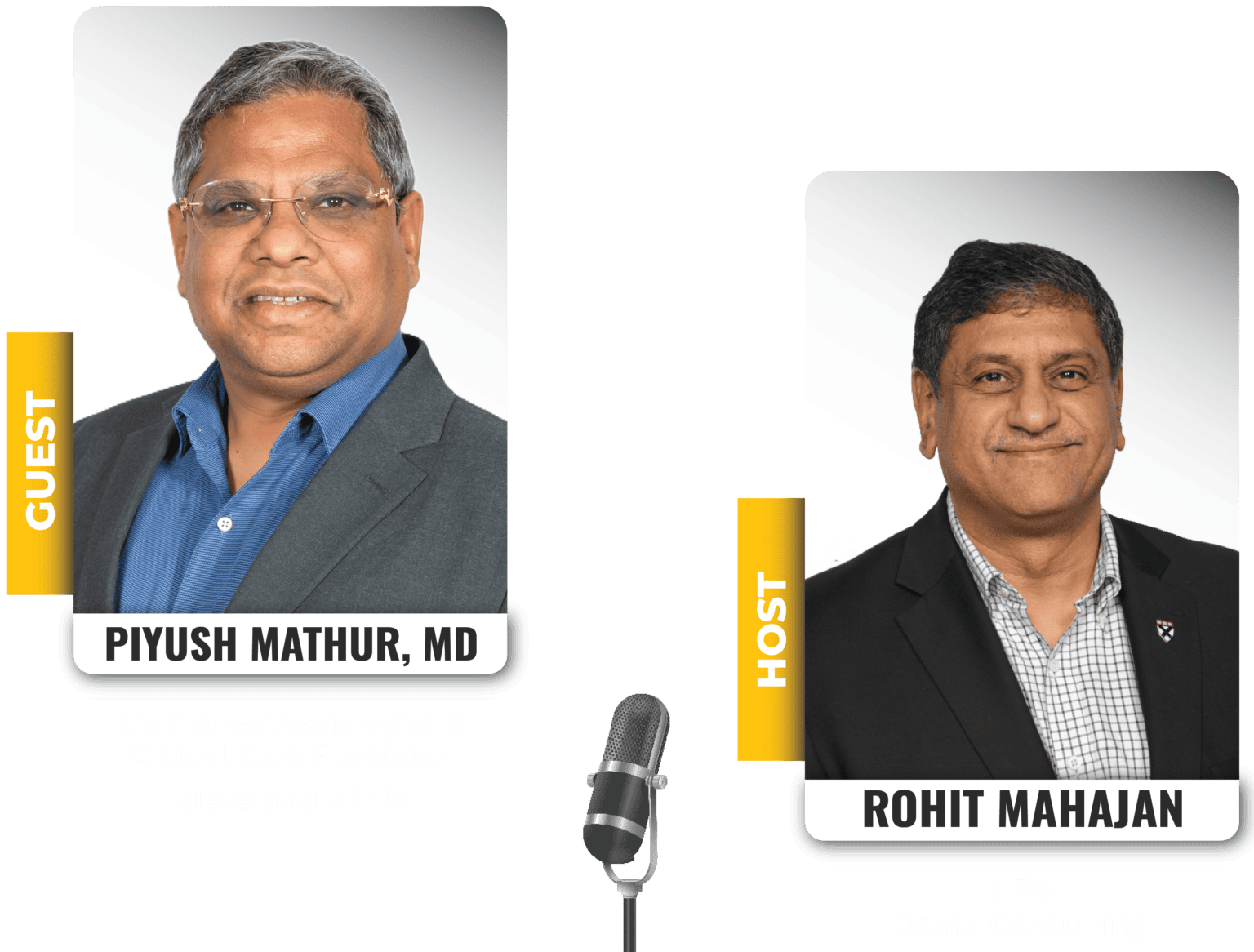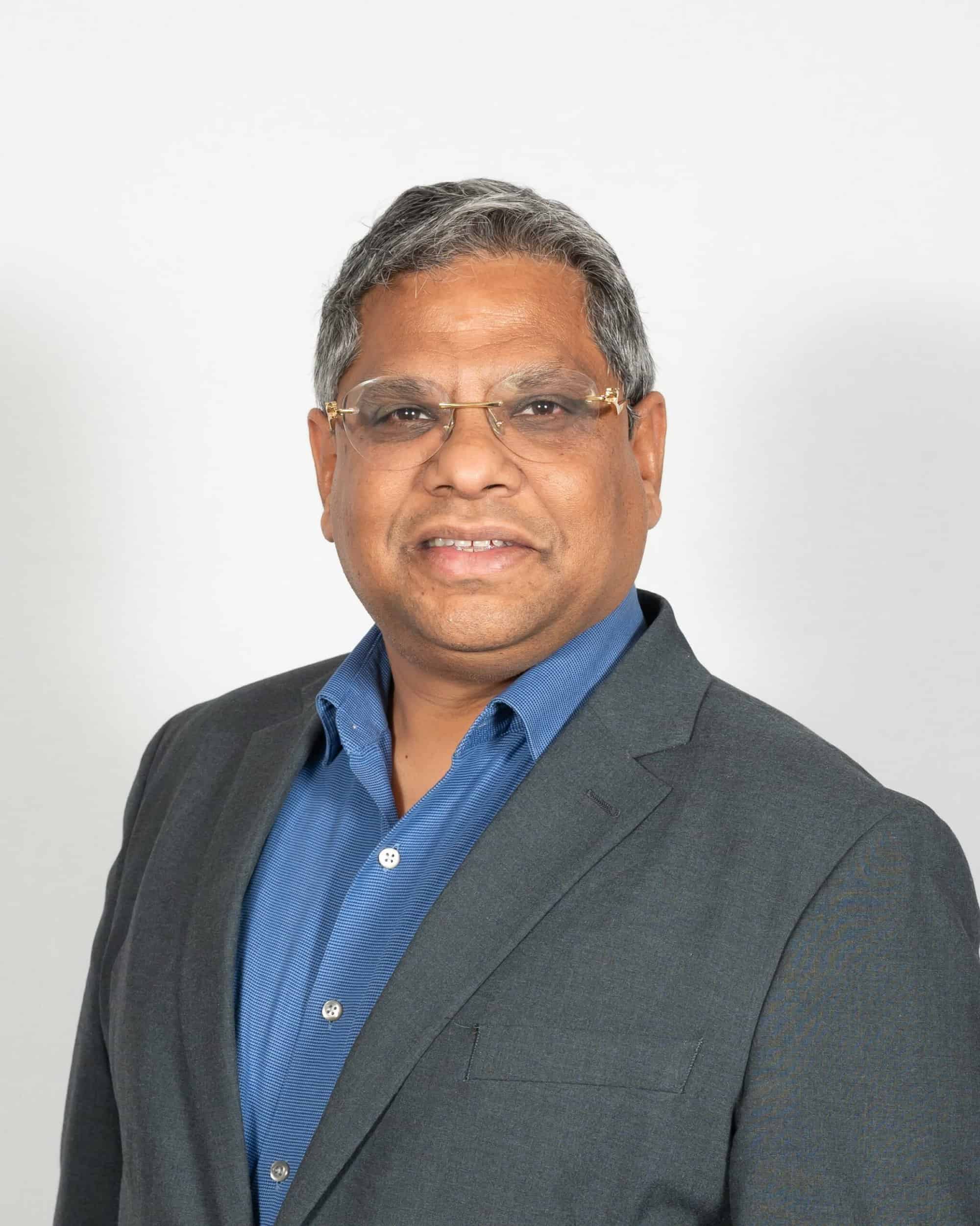Season 5: Episode #148
Podcast with Dr. Joel Klein, Senior Vice President and Chief Information Officer, University of Maryland Medical System
Our Digital Transformation Efforts are Toward Reducing Unnecessary Variation in Patient Care and Experience
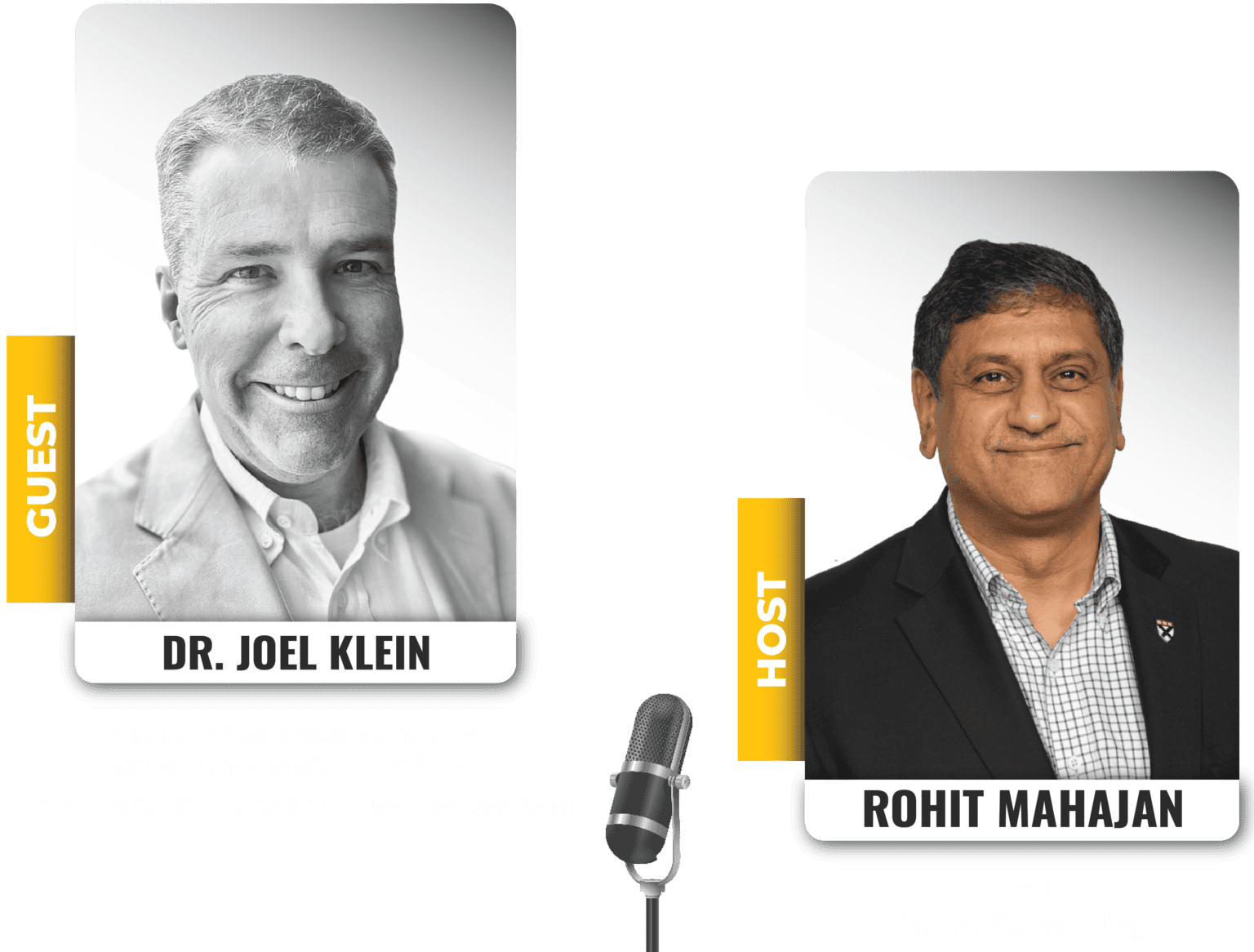
Share
In this episode, Dr. Joel Klein, Senior Vice President and Chief Information Officer at the University of Maryland Medical System, shares his journey from practicing emergency medicine to leading digital transformation efforts as a CIO. He discusses the health systems’ digital transformation journey, which began in 2012 with the adoption of a single electronic medical platform across the organization and highlights key lessons learned along the way.
Dr. Klein emphasizes the importance of reducing variation and driving consistency in healthcare by ensuring all care team members work on a unified platform with a common set of tools and patient visibility. He also highlights the importance of innovation in healthcare, including the development of clinical devices that integrate advanced technologies, and stresses the importance of robust governance and strategic decision-making to foster successful innovation.
Dr. Klein also shares insights into the role of AI and Generative AI technologies in accelerating the pace of innovation, improving patient care, and enhancing healthcare delivery. He also highlights the critical need to prioritize cybersecurity and privacy as these technologies evolve.
Show Notes |
||||
| 01:14 | What interests you in the healthcare industry segment to become the CIO of a hospital system? | |||
| 02:47 | How long have you been in the leadership position at UMC, where is it located, and what kind of population does it serve? | |||
| 03:35 | You have done a lot of work from technology perspective to support the business needs of the hospital. You've done over 200 applications and transformed the EMR system. Would you like to share with the audience the thought process that drove those changes and what were some of those changes? | |||
| 07:47 | What do you think about your digital transformation efforts? If you could describe a few of them which have had impact on the patient population. | |||
| 08:30 | Please describe in your own, you know, way that what is digital transformation for provider systems such as yours? Where do you see it going? Some of the challenges that you might have faced and how did it actually end up impacting patients? | |||
| 11:24 | How did you manage to change the mindset of the people? How did they manage to change themselves? To adapt to this new world where technology, especially with AI and GenAI and other new technologies which are coming our way, how do you change mindsets and change behaviors and change culture over there? | |||
| 13:00 | Would you like to provide one example of how the technologies which you were implementing, and you continue to be implementing in your hospital system are accessible and usable by a variety of users, including within the hospital and outside the hospital. | |||
| 16:28 | How do you innovate? Do you involve external parties? Do you have some kind of a, you know, innovation focus department? Or is it part and parcel of everybody's, you know, kind of like daily life? | |||
| 19:24 | What are your thoughts on new technologies, especially Gen AI? Have you been experimenting with any predictive analytics or large language models? What would be your advice or thoughts to any other healthcare leaders on how to go about this journey of exploration? | |||
| 22:15 | Standing here now and looking back, if you were able to go back and change one or two things, what would you like to do differently or have done differently? | |||
Video Podcast and Extracts
About our guest
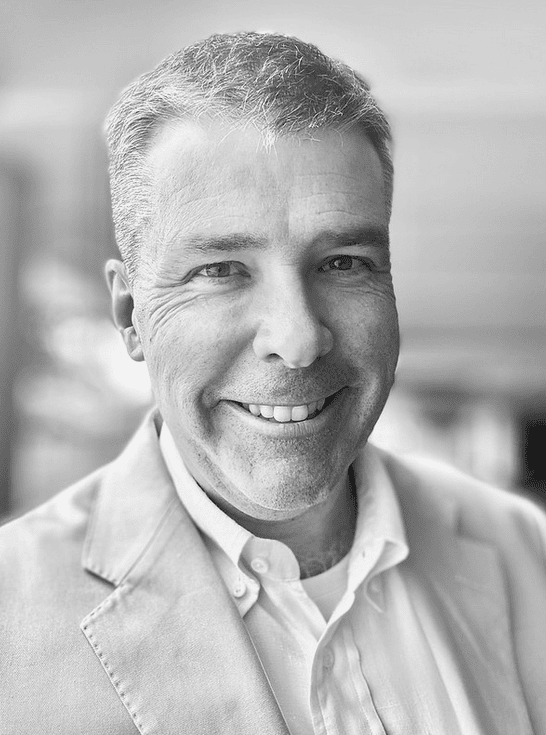
Dr. Joel Klein is the Senior Vice President and Chief Information Officer for the University of Maryland Medical System. He is responsible for all IT applications, technology infrastructure, training, implementations, cybersecurity, and product development across the clinical and business frontiers of the 12-hospital, $4.9B enterprise.
Dr. Klein began working in health information technology as soon as he joined the medical staff of a community hospital in 2004, writing quality-focused apps and patient flow monitoring tools. He also created the first data-driven incentive compensation model used by Baltimore Washington Emergency Physicians (a 60-provider private group), where he was elected group President with special additional focus on revenue cycle and payor contracting. He was voted Physician of the Year by his specialty society in Maryland in 2008 and by his peers at his hospital in 2013.
In 2011, he was appointed the Medical Director of Informatics at UM BWMC and helped lead the first community hospital implementation of Epic at UMMS a year later. Over the next seven years, he led the UMMS digital transformation to a single common care platform across the entire clinical enterprise. He joined the UMMS leadership team full time in 2017 after serving in other progressive leadership roles in the corporate information technology group and has been the SVP/CIO since 2019. He was voted the Orbie CIO of the Year for Large Enterprises in the national capital region in 2021.
Dr. Klein graduated from Yale University and holds an MD degree from the University of Texas Southwestern Medical School in Dallas. He also earned masters degrees in Medical Ethics from the University of Washington in Seattle and Cybersecurity from the University of Maryland Baltimore County. He is a graduate of the Johns Hopkins Residency in Emergency Medicine and still an active member of the medical staff at Baltimore Washington Medical Center in Maryland.
Recent Episodes
Q. Would you like to start with some introductions, Joel, and talk about a little bit about your journey so far?
Joel: Sure, thanks very much for having me, Rohit. I’m Joel Klein, the Chief Information Officer at the University of Maryland Medical System. We’re a 14-hospital system here in Maryland and one of the largest nonprofit employers in the state. I think we might actually be the largest.
We’re one of the dominant health systems in the DMV area. Our academic health system in downtown Baltimore provides everything from multi-organ transplants to high-acuity trauma care, bone marrow transplants, and other quaternary care services.
In addition, we have many community hospitals, rural healthcare facilities, and ambulatory sites across the state. It’s an integrated delivery system that operates in close partnership with the University of Maryland’s School of Medicine, School of Pharmacy, School of Nursing, and others.
Although we’re a private company established decades ago and not formally part of the university system, we work very closely with them. We operate very much as an academic health system with strong community components.
Q. That’s awesome. Joel, I understand you studied to be a physician. I’d be very curious to hear how you moved from being a physician, and perhaps a practicing one, to this side of things.
Joel: Sure. I’m an emergency doctor. I went to medical school back home in Texas at the University of Texas Southwestern Medical School and completed my emergency medicine training at Johns Hopkins. After residency, I was hired at one of our community hospitals in the system, where I still work.
I was the “night guy” for many years, working night shifts and taking care of everyone. It was a very busy place—at the time, it was one of the biggest emergency departments on the East Coast, with over 100,000 visits a year, which is massive by ER standards. The hospital was surrounded by nursing homes and assisted living facilities, so I saw a lot of elderly patients with sepsis, hip fractures, and other “bread and butter” community emergency cases.
I was eventually elected to lead my group of 60 doctors, nurse practitioners, and PAs. In that role, I oversaw incentive compensation, which was tied to performance metrics. To manage that effectively, I needed data—something that didn’t really exist at the time, about 20 years ago. Performance was mostly judged subjectively.
To get the data I needed, I began collaborating with the IT team. I worked with them to track metrics like door-to-doctor time, throughput time, admission rates, and compliance with treatment protocols, such as administering the right antibiotics for pneumonia or sepsis. This partnership with IT helped me access the data I needed to objectively evaluate and improve performance.
Around 2012, our organization embarked on a digital transformation journey, implementing a single electronic medical record (EMR) platform across the entire system. This unified platform gave us all the same situational awareness of our patients and allowed us to operate more seamlessly. I played a leadership role in that project early on.
By 2015, I had officially joined the IT leadership team, and in 2019, I became the CIO. This is now my sixth year in the role.
I still maintain my medical license—I just renewed it, actually—and I remain on the medical staff at that community hospital. During the first half of COVID, I split shifts with my old partners, working early mornings, from 5 a.m. to 9 a.m.
However, balancing shifts with family life and the demands of being a CIO eventually became overwhelming. I stopped practicing about three years ago. While I could still go back to it if needed, my focus is now entirely on my CIO responsibilities.
Q: I’m very, very impressed by your early decision in 2012 to go for the single medical record and also start your digital transformation journey. With over five years in the CIO role, could you share with the audience some lessons learned, roadblocks, or difficulties you found along the way? Where do you think you are in the journey? Do you think it’s completed, or is there still a lot more to do?
Joel: There’s a whole bunch to talk about here, obviously, but if I were to pick out one key thread, it’s this: the thing we’re really trying to do in medicine is reduce unnecessary variation in how we care for patients. There is a best way, for instance, to manage things like pneumonia, sepsis, hip fractures, prenatal screening, or how a delivery in obstetrics should be handled. There are best practices in all of these areas.
One of the biggest tools that any healthcare organization has to drive consistency and encourage all members of the care team—doctors, nurses, therapists, and others—to practice consistently is by having everyone on the same platform. A common set of tools and visibility into patients allows us to use data to address that variation.
If you’re all on different platforms—if, for example, the eastern half of your organization uses one system and the northern half uses another—you’re always going to be fighting against that variation. You’ve got to get everyone on the same playing field, not just to have a common situational awareness of a given patient or part of your organization but also because it’s the way to get to consistency.
There are so many tools within electronic medical record systems that can help drive that consistency. If we don’t move towards reducing unwanted, unnecessary variation, we’re never going to get costs under control, and we’re never going to see best practices done everywhere as they should be.
We’ve gotten onto a common platform and are very far along in driving towards consistency, but this is a never-ending journey. It’s still something we’re actively working on as a system.
Q. It is very interesting that you mentioned about reducing variation and driving consistency. How would that come into play, Joel, if there was any situation of, let’s say, acquisitions where you now have to deal with a hospital system that came into the same portfolio or a new set of physicians and they are not used to the same platforms or the tools or the systems that you are driving?
Joel: Yeah. A lot of health systems are dealing with this right now. I mean, this is true for any acquisition, any MNA activity. So I think you could generally speaking, divided up into two categories. One is an acquired entity or an entity that joins, you know, a health system or, you know, a larger company, um, that is smaller and less sophisticated and less mature.
And in that case, usually they welcome the help, you know, part of that’s the whole rationale for why, you know, we joined up in the first place. You know, I, I know. Um, some of the organizations that joined our health system, you know, it’s change and change is always hard, but the opportunity to to benefit from all the hard work we’ve done over the last, you know, 12 plus years in the journey that I just described, you know, they get to benefit from that without having to put in all that sweat equity, uh, that we’ve developed.
So that’s one scenario. The other scenario is harder, and that’s when you have two kind of like sized organizations that join forces to try to get some economies of scale. And the question is, how are you going to navigate, you know, the digital side of that merger? And it’s hard. Um, typically speaking, you’ve got to pick, right?
You’ve got to say, well, let’s go with this one and let’s extend that umbrella out, right? And the challenge is having governance to say, well, how do you do it? How do we do it? And I think the hardest part is, you know, getting that, um, that pattern getting into a groove of compromise. And, you know, it starts with trust.
It starts with dialogue. It starts with the leaders. Uh, not just the I. T. Leaders, but the clinical leaders and the operational leaders, you know, having relationships with each other, um, and realizing that, you know, it doesn’t really matter, uh, necessarily whether we do it, you know, whether the wallpaper is this wallpaper or that wallpaper, because they’re both okay, let’s pick some wallpaper.
Um, and, and that way, you know, we don’t have to spend a bunch of energy maintaining both kinds of wallpaper. Yeah, and you know, that’s some of the hardest work there is. Um, and, um, but it’s, it’s part of what makes the job fun and exciting.
Q: I’d like to shift gears a little bit, Joel, and ask about how you approach innovation. What’s your thought process? In a large system, innovation is usually difficult to do. How do you gather innovative ideas from patients, your nursing staff, physicians, or any other constituents or stakeholders in the organization?
Joel: Yeah, right. I think you have to approach it in two ways. One, you have to, right? Everyone knows you have to water the plants or they won’t grow. So you need a way to listen for innovative ideas, collect them, and then find a way to put some gasoline behind them and get them the resources they need to try to run with them.
Sometimes that involves identifying people out in the organization who are not part of IT and bringing them into IT, connecting them to larger teams that can help them. Clinical engineering is a great example in healthcare organizations, where people are out there repairing things and dealing with biomedical devices. They’re not always part of IT. You need to find talent in the organization that can benefit from the resources IT typically provides, whether that’s project management or infrastructure that isn’t intrinsic to clinical engineering. That’s just one example. So, you’ve got to be listening, and you’ve got to find a way to run with the ideas.
On the other hand, we have the “good idea fairy,” right? When the good idea fairy shows up, each hospital might have two to three projects or pilots they want to run. All of a sudden, you have 50 new projects, and that’s just not possible. So, you’ve got to have some governance.
Some of that governance requires command and control. You need people who have the right eye for success. If you have a big committee vote on ideas, you’ll get into groupthink, and sometimes real opportunities will be missed. You need people who can smell something good when they see it, and you need a process that’s not a dictatorship or some backroom deal. It’s a tricky balance, but you have to balance all of these things for innovation to be successful.
Q: Can you share some examples with us or anything that pops into your mind of something that you and your team have done that is innovative and that you are thinking of taking further along?
Joel: Yep. So, you know, there’s a ton of examples, some of which we’re really excited about in terms of products that we’ve developed that we feel have a serious future on the marketplace. But speaking generally, and running with the theme of clinical engineering, we believe that, just like all of us run around with our phones and use them for so much of our daily tasks, we’ve been spending a lot of time in our organization thinking about the devices in our nurses’ pockets.
How do we get more and more of the technology that patients depend on—everything from clinical monitors, cardiac monitors, fetal monitors, ventilators, nurse call systems, telemedicine, and, of course, the electronic medical record system—into a clinical device? The goal is to make it indestructible, vomit-proof, and in a form factor that our nurses really love using.
A lot of the devices we have to choose from, like an iPhone, are consumer devices, right? They’re not designed for healthcare. Whether it’s from a form factor point of view or user infrastructure point of view, iPhones are built to be used by individual users, not shared devices. That’s not what we’re going for.
So, you’ve got to wrap all of that together. It’s a lot of engineering and it has to unify a ton of vendors. What I just described isn’t the work of just one vendor, right? You need a team capable of putting that engineering together from so many different platforms. That’s an area where we’re really working hard to create something that our nurses will love to use.
Q: So, you mentioned something very interesting that ties into the environment many of us are facing right now, where you have to do more with less, in terms of budgets and resources. You mentioned throwing gasoline on a project, and to do that, you need money, resources, time, and energy to pursue these initiatives. How do you make that happen in an environment where budgets may not be available?
Joel: Yeah, so it’s a bunch of tactics. One, you have to look inside. In any IT shop, there’s probably stuff you’re doing that you don’t really need to be doing. You’ve got to be really thoughtful about that. I’m not saying stop keeping the lights on; I’m not saying that at all, but you’ve really got to be thoughtful about whether the work you’re doing is adding value. There are always people who will try to hide behind work because it’s easy, so you’ve just got to pay a lot of attention to that.
The second thing is, you’ve got to make it clear to your organization the value of what you’re doing. You need to talk about what you’re doing and what’s possible because, you know, we assume the budget is X. In my organization, the narrative from our finance community is that we need to find a way to get IT more resources. Yes, there’s the narrative of doing more with less, but remember, from a capital point of view, we’ve got to build new hospitals and buy new medical equipment. It’s a very capital-intensive industry. So how you frame all of that is key. Do they know what you’re working on? You’ve got to be able not just to tell the story, but also to demonstrate the art of the possible. Some of that involves making sure that everyday users feel the impact of what you’re doing.
And then, the last thing is good governance. You can’t just pull stuff out and say, “We’re not going to do this anymore.” A much better choice is to give the organization options. You know, say, “We want to pull X million dollars in costs out of the organization. Here are five ways to do that. They’re all terrible, but what do you think is the least terrible?” And you want the right people around the table making that decision rather than me making a unilateral one. As a doctor, I could do that, and it might be more credible, but it’s better if I do it in lockstep with my peers.
Q: Since we’re talking technology, Joel, there has been such a rapid change in new technologies like Gen AI and large language models that have really changed the AI landscape. Everyone is experimenting with Gen AI in some form or another, whether they like it or not. So, what are some of your thoughts around AI and Gen AI? How do you see these technologies accelerating innovation or improving patient care and healthcare delivery?
Joel: You’ve got to think about cybersecurity and privacy. You can’t dump a bunch of protected health information into some Gen AI platform and risk that data becoming public or leaked through a malformed or malicious prompt. That’s a real issue we need to address as an industry, and our vendors will have to help us if we want to really lean into these technologies.
That said, there’s a ton that the industry is looking at, and we certainly are, too. Ambient technology is a big piece of this. We’re piloting a number of solutions, and it’s promising, just like many new technologies are. The challenge is whether every doctor is going to appreciate ambient documentation the same way. This involves having a microphone in the room, typically on the doctor’s phone, that records the dialogue between the doctor and the patient. The output is documentation of the visit, which can take 5 to 10 minutes per patient if the doctor’s typing, or maybe only 60 seconds to review if they’re looking over what the AI generated.
It’s promising, but a third to half of providers love it, some aren’t sure, and others aren’t convinced. So, how do we get these providers to adopt it? How do we coach them? It’s like autopilots in airplanes—there will always be those who say, “Back in my day, we didn’t have that.” But it’s a tool for safe and efficient flight, so how do we get people to embrace it? That’s one example.
Another big area is idea generation. Whether it’s for an individual patient or hospital-wide strategies like patient flow, how can we use AI to come up with new solutions? What are we missing? AI excels at thinking about things differently, and that’s incredibly valuable in healthcare. Those are just a few of the thoughts we’re considering.
Q: So, you’re already looking at possibly using GenAI, and it’s crossing functional areas now, so you can actually use it in many different functional areas at the hospital system. You mentioned that you were at a VC conference and that you might want to share some thoughts and ideas from your visit at the conference. So what are some of your thoughts there?
Joel: Yes. Well, I’d say two things. It was an amazing meeting. There were about 250 or so CIOs from all different industries, including some of the biggest companies in the country. I think what’s fascinating is how all of us in IT leadership are fighting the same battles. We’re all dealing with vendors that are engaging in really punitive price increases. They’ll acquire something and then jack the price 500%. It’s not going to work. We will find a way out of that, and it’s a huge problem.
We’re all dealing with AI, productivity vendors, and capital challenges. Whether it’s an ERP vendor or CRM or anything IT-related, we’re all doing the same stuff no matter what the industry is. It’s just fascinating to hear that.
The other idea that I heard was using AI for idea generation. So, you know, here’s a business problem we have—give me five unorthodox solutions that I didn’t think about, or even some really crazy prompts, like, “Imagine the following business problem—how would the Middle Ages have dealt with this?” And it sounds ridiculous, but it’s not, because it gives you a spark, like a little way of connecting things.
What I heard from a lot of my colleagues at big companies is that that’s what they’re doing to try to get an edge on their competitors. I love it, because it sounds wild and fun. It’s a great way to keep us all collectively engaged at the highest levels, solving some of the toughest problems we’ve got today.
Q: I would love to get your thoughts on value-based care, Joel. Are you already in the midst of that? Are you planning for that? And what are some of your suggestions and advice for people who are thinking about that?
Joel: Yeah, so value-based care is not new. This is something that I think the whole industry has been trying to figure out, in some cases very successfully, and in some cases not so successfully. It’s this whole idea of having skin in the game, for some block of covered lives.
I think it comes back to how much we can focus on primary prevention. As long as we have contracts—this is Joel’s opinion— as long as we’re talking in terms of single-year, time periods of responsibility, primary care is always going to take a back seat. So, in other words, if I’m really accountable for getting patients to lose 20 pounds because of the health upside of that from heart disease or hip replacement, there’s just so many ways. But if I’m only responsible for, you know, between now and the end of the fiscal year, I’m not going to worry too much about that. It’s too short a time period.
So, how do we think about that? To me, that’s something that the whole value-based care space needs to think more about. Then, how can we partner better with payers? Who are the intermediaries here? A lot of people say the payers just suck money out of the system and they’re just bureaucracy, skimming 10-15%. But I think it’s more complicated and nuanced than that. They do have the ability to help providers be more strategic about how they apply resources. I think there’s more than just, “We’ll give you some analytics or a list of things to do,” but I think there’s opportunity there.
Q: Would you like to share some final thoughts on any new initiatives around digital transformation that you’re thinking of in the next few months or years? What do you see coming your way or our way as an industry?
Joel: Part of why I love my job is the whiplash. I’m going from this conversation to a meeting about how we can support philanthropy more aggressively, and then my meeting after that is with our CTO to talk about all the projects we have going on there. And then my afternoon is focused on our informatics team and how it’s, I mean, that’s like typical.
So, it’s great because there’s so much to do in our industry. I don’t think I’m alone. And, you know, to sort of point to any one thing would be saying, well, I love this child best. There’s just so much. And to me, that’s what’s so much fun about this job.
We hope you enjoyed this podcast. Subscribe to our podcast series at www.thebigunlock.com and write to us at [email protected]
Disclaimer: This Q&A has been derived from the podcast transcript and has been edited for readability and clarity.
About the host
Paddy is the co-author of Healthcare Digital Transformation – How Consumerism, Technology and Pandemic are Accelerating the Future (Taylor & Francis, Aug 2020), along with Edward W. Marx. Paddy is also the author of the best-selling book The Big Unlock – Harnessing Data and Growing Digital Health Businesses in a Value-based Care Era (Archway Publishing, 2017). He is the host of the highly subscribed The Big Unlock podcast on digital transformation in healthcare featuring C-level executives from the healthcare and technology sectors. He is widely published and has a by-lined column in CIO Magazine and other respected industry publications.
About the Host

Ritu M. Uberoy has over twenty-five years of experience in the software and information technology industry in the United States and in India. She established Saviance Technologies in India and has been involved in the delivery of several successful software projects and products to clients in various industry segments.
Ritu completed AI for Health Care: Concepts and Applications from the Harvard T.H. Chan School of Public Health and Applied Generative AI for Digital Transformation from MIT Professional Education. She has successfully taught Gen AI concepts in a classroom setting in Houston and in workshop settings to C-Suite leaders in Boston and Cleveland. She attended HIMSS in March 2024 at Orlando and the Imagination in Action AI Summit at MIT in April 2024. She is also responsible for the GenAI Center of Excellence at BigRio and DigiMTM Digital Maturity Model and Assessment at Damo.
Ritu earned her Bachelor’s degree in Computer Science from Delhi Institute of Technology (now NSIT) and a Master’s degree in Computer Science from Santa Clara University in California. She has participated in the Fellow’s program at The Wharton School, University of Pennsylvania.
About the Host
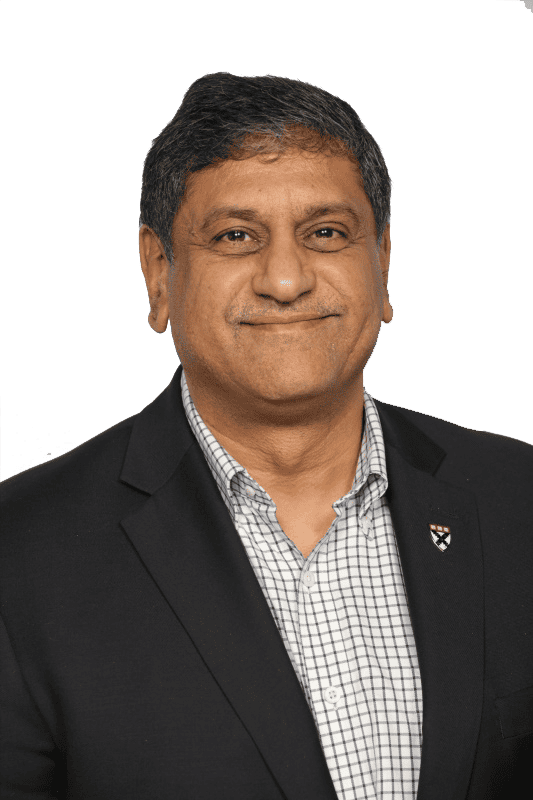
Rohit Mahajan is an entrepreneur and a leader in the information technology and software industry. His focus lies in the field of artificial intelligence and digital transformation. He has also written a book on Quantum Care, A Deep Dive into AI for Health Delivery and Research that has been published and has been trending #1 in several categories on Amazon.
Rohit is skilled in business and IT strategy, M&A, Sales & Marketing and Global Delivery. He holds a bachelor’s degree in Electronics and Communications Engineering, is a Wharton School Fellow and a graduate from the Harvard Business School.
Rohit is the CEO of Damo, Managing Partner and CEO of BigRio, the President at Citadel Discovery, Advisor at CarTwin, Managing Partner at C2R Tech, and Founder at BetterLungs. He has previously also worked with IBM and Wipro. He completed his executive education programs in AI in Business and Healthcare from MIT Sloan, MIT CSAIL and Harvard School of Public Health. He has completed the Global Healthcare Leaders Program from Harvard Medical School.
About the Legend
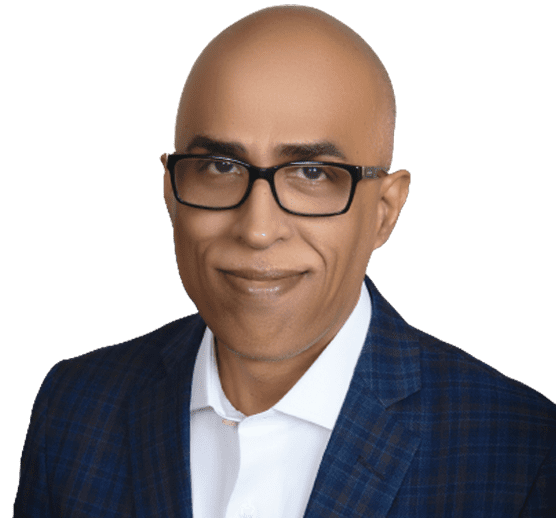
Paddy was the co-author of Healthcare Digital Transformation – How Consumerism, Technology and Pandemic are Accelerating the Future (Taylor & Francis, Aug 2020), along with Edward W. Marx. Paddy was also the author of the best-selling book The Big Unlock – Harnessing Data and Growing Digital Health Businesses in a Value-based Care Era (Archway Publishing, 2017). He was the host of the highly subscribed The Big Unlock podcast on digital transformation in healthcare featuring C-level executives from the healthcare and technology sectors. He was widely published and had a by-lined column in CIO Magazine and other respected industry publications.

